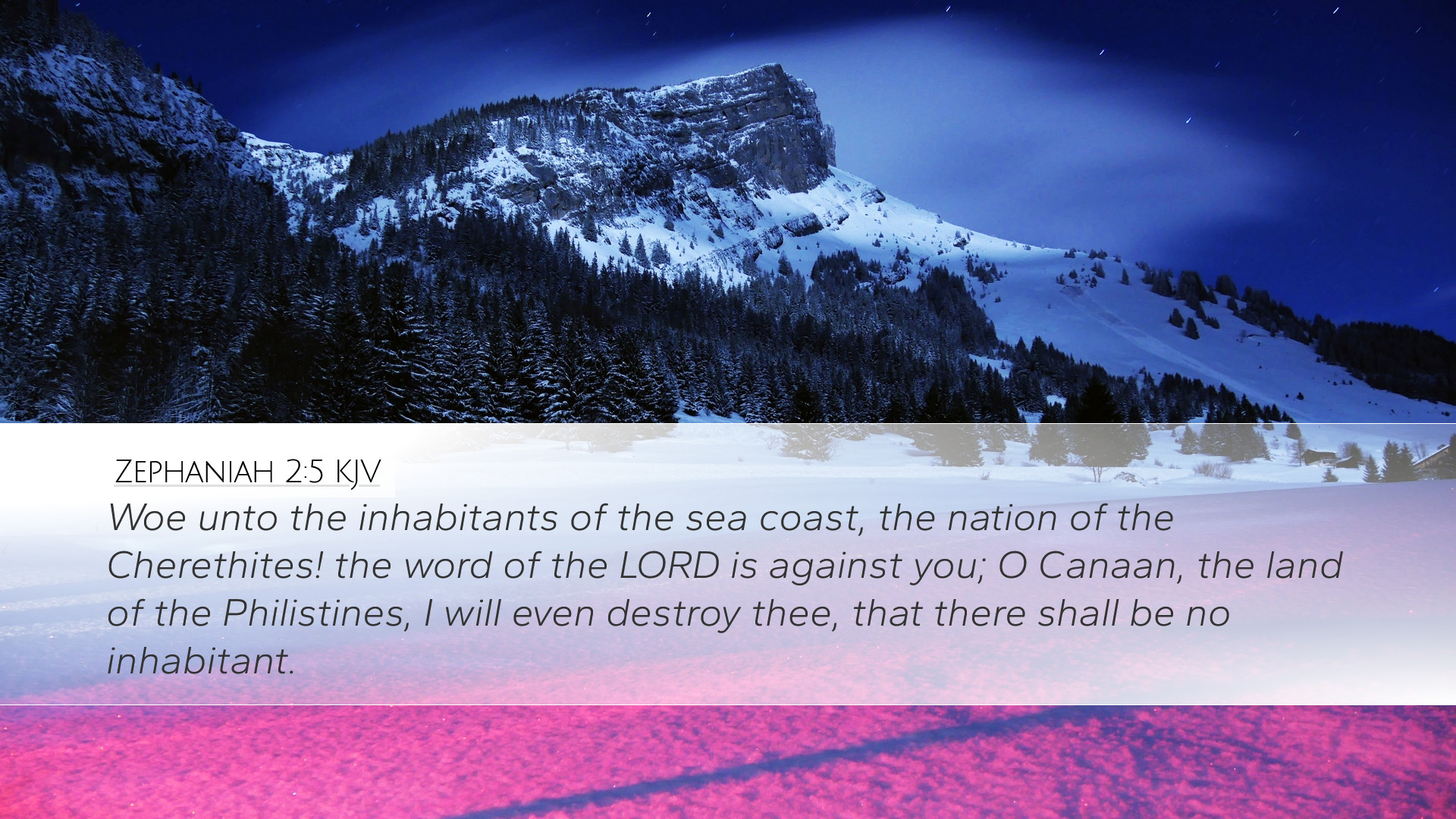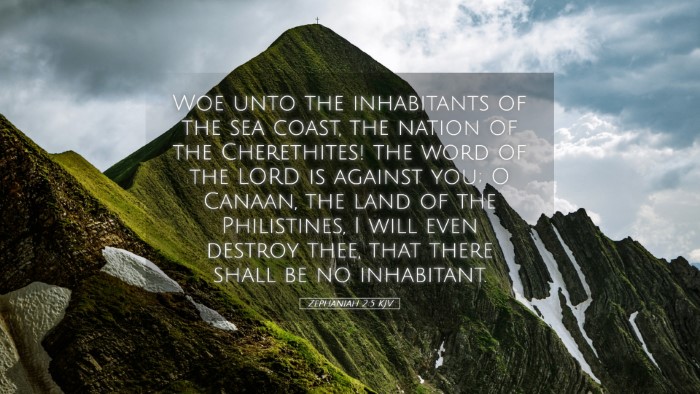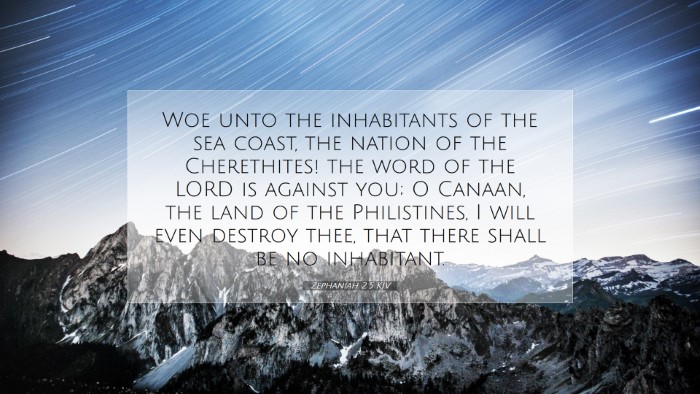Old Testament
Genesis Exodus Leviticus Numbers Deuteronomy Joshua Judges Ruth 1 Samuel 2 Samuel 1 Kings 2 Kings 1 Chronicles 2 Chronicles Ezra Nehemiah Esther Job Psalms Proverbs Ecclesiastes Song of Solomon Isaiah Jeremiah Lamentations Ezekiel Daniel Hosea Joel Amos Obadiah Jonah Micah Nahum Habakkuk Zephaniah Haggai Zechariah MalachiZephaniah 2:5
Zephaniah 2:5 KJV
Woe unto the inhabitants of the sea coast, the nation of the Cherethites! the word of the LORD is against you; O Canaan, the land of the Philistines, I will even destroy thee, that there shall be no inhabitant.
Zephaniah 2:5 Bible Commentary
Commentary on Zephaniah 2:5
Verse: Zephaniah 2:5 - "Woe unto the inhabitants of the sea-coast, the nation of the Cherethites! The word of the LORD is against you; O Canaan, the land of the Philistines, I will even destroy thee, that there shall be no inhabitant."
Introduction
Zephaniah's prophetic message contains fierce denunciations aimed at various nations surrounding Judah, in particular the Philistines, whose primary cities were found along the coast of the Mediterranean Sea. This verse highlights a judgment against the Cherethites, often identified as mercenaries or philistine inhabitants, emphasizing God's impending wrath upon them as part of His larger plan for justice and restoration.
Contextual Framework
The book of Zephaniah was written during the reign of King Josiah, amidst a backdrop of rampant idolatry and social injustice within Judah. Zephaniah’s prophecies not only concern Judah but also extend to surrounding nations, indicating the universality of God's judgment. This broader context is essential to understanding the specific declarations made in Zephaniah 2:5.
Insights from Public Domain Commentaries
Matthew Henry’s Commentary
Matthew Henry states that the mention of "the sea-coast" signifies a geographical reference that underscores a sense of isolation and vulnerability amidst external threats. The term "Cherethites" likely refers to the inhabitants of the coastal areas and may symbolize the enemies of God’s people. Henry emphasizes the significance of God's declaration against the Philistines, noting that they exemplified much of the corruption detested by the covenant relationship God desires with His people.
Albert Barnes’ Notes on the Bible
Barnes notes that Zephaniah here addresses not merely a geographical region but also cultural and spiritual implications. The "word of the LORD" is a powerful oracle that transcends mere prophecy; it is a declaration that carries weight and consequence. According to Barnes, the term "woe" indicates impending disaster, signaling the divine judgment that is inevitable for the Philistines due to their longstanding opposition to God's people. Furthermore, the mention of Canaan illustrates that God’s plans encompass the entirety of the Promised Land, indicating divine authority over all nations.
Adam Clarke’s Commentary
Adam Clarke interprets this passage as a part of God’s larger scheme of retribution against all enemies of Israel. Clarke reflects on the significance of the "Cherethites," who represent both a lineage and a present-day reality in the spiritual war waged on God’s behalf. He suggests that this proclamation of doom is a necessary step in God’s unfolding narrative of justice, ensuring that no corrupt or oppressive influence remains to disrupt His people’s relationship with Him. Importantly, Clarke draws attention to the phrase "that there shall be no inhabitant," indicating complete destruction, not just for the physical land but also for the spiritual influence it represents.
Theological Themes and Implications
Divine Judgment
This verse clearly reflects God’s role as judge. Throughout scripture, it is evident that God takes action against injustice and idolatry. The specificity of this judgment on the Cherethites and the Philistines suggests a targeted response to moral decay and enmity towards God’s chosen people.
The Nature of Prophecy
The oracle against the Philistines serves as a reminder of the prophetic voice's role in declaring God's word and purpose. Prophecy serves as both a warning and a hope—exposing rebellion while affirming God’s sovereignty and eventual restoration of His people.
God's Sovereignty Over Nations
This passage underscores the idea that God is not only concerned with Israel but is sovereign over all nations. The relations between nations as depicted in scripture illustrate God’s authority over geopolitical matters, culminating in His ultimate plan for redemption and justice.
Conclusion
In Zephaniah 2:5, we see a multi-faceted reflection of divine judgment aimed at ensuring justice amongst nations and securing the covenant relationship of Israel with God. This verse serves as a rallying cry for theologians, pastors, and students of the Word to appreciate the profound seriousness with which God regards both righteousness and the dire consequences of turning away from Him. As the historical context and rich insights from various commentators reveal, the truth found in this passage speaks volumes about God’s unwavering character and His interactions with humanity.


